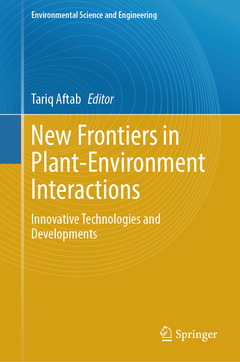New Frontiers in Plant-Environment Interactions, 1st ed. 2023 Innovative Technologies and Developments Environmental Science and Engineering Series
Coordonnateur : Aftab Tariq

This book provides information about plant?environment studies and challenges for plant improvement to achieve food security. Plants face a wide range of environmental challenges, which are expected to become more intense as a result of global climate change. Plant?environment interactions play an important role in the functioning of ecosystems. There are habitats throughout the world that present challenges to crop plants, such as through a lack of water and excessive, or toxic, salts in the soil. Soil properties represent a strong selection pressure for plant diversity and influence the structure of plant communities and participate to the generation and maintenance of biodiversity. Plant communities selected by environment grow by modifying soil physical, chemical, and biological properties, with consequent effects on survival and growth of plants. The complexity of plant?environment interactions has recently been studied by developing a trait-based approach in which responses and effects of plants on environment were quantified and modeled. This fundamental research on plant?environment interaction in ecosystems is essential to transpose knowledges of functional ecology to environmental management. Plants have adapted to an incredible range of environment, and extensive researches on ecological and environmental plant physiology have provided mechanistic understanding of the survival, distribution, productivity, and abundance of plant species across the diverse climates of our planet. Ecophysiological techniques have greatly advanced our understanding of photosynthesis, respiration, plant water relations, and plant responses to abiotic and biotic stresses, from instantaneous to evolutionary timescales. Ecophysiological studies also provide the basis for scaling plant physiological processes from the tissue to the canopy, ecosystem, region, and to a large extent, the entire globe. Given the above, the author proposes to bring forth a comprehensive book, ?New Frontiers in Plant-Environment Interactions?, highlighting the various emerging techniques and applications that are currently being used in plant?environment interaction research and its future prospects. The author is sure that this book caters the need of all those who are working or have interest in the above topic.
Provides information about plant–environment studies and challenges for plant improvement to achieve food security
Explains strategies, tools, and techniques used in ecophysiological studies
Covers an array of topics and issues related to sustainable development
Date de parution : 10-2023
Ouvrage de 570 p.
15.5x23.5 cm
Disponible chez l'éditeur (délai d'approvisionnement : 15 jours).
Prix indicatif 189,89 €
Ajouter au panier


